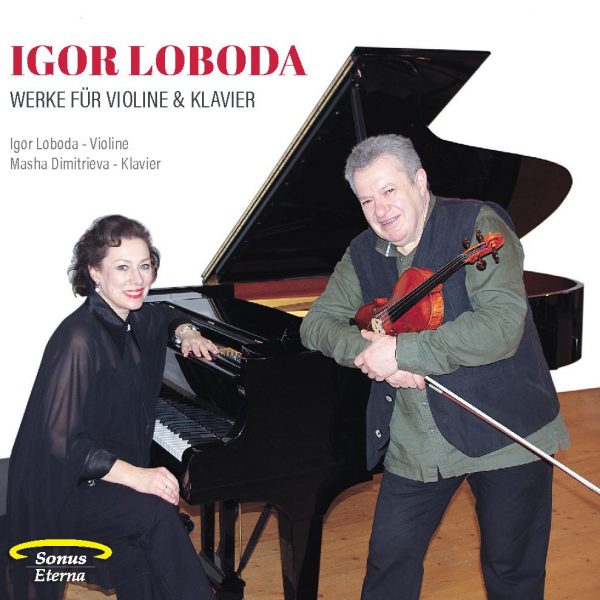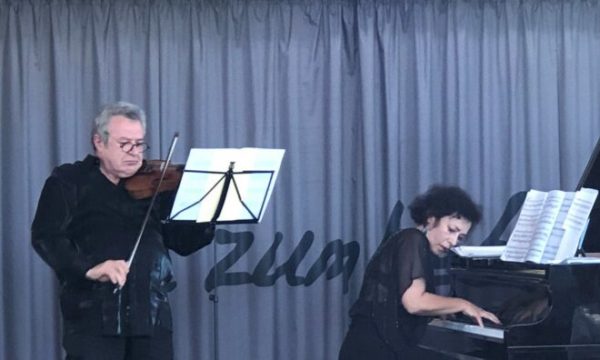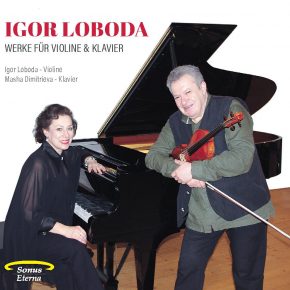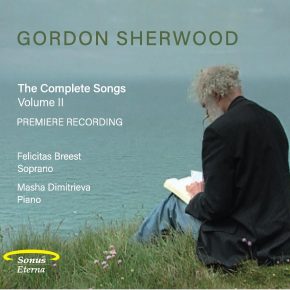
CD: IGOR LOBODA – WORKS FOR VIOLIN & PIANO
September 13, 2022
By Manfred A. Schmid
“What the Georgians sing is more important than all the new discoveries of modern music. It is incomparable and simple. I have never heard anything better,” Igor Stravinsky said about Georgian music. When works by Igor Loboda, a composer with a Georgian background, are released on CD for the first time, even more so on the Sonus Eterna label, which has set itself the goal of “making the unknown known,” the interest is naturally great. What kind of own touch has this composer, who was educated in Tbilisi and Petersburg, to add to the music of the present? Does he succeed, and if so: how does he succeed in enriching music with his creations?
Born in Tbilisi in 1956, Loboda does not sing, but plays the violin and is a member of the Georgian Chamber Orchestra, with which he came to Ingolstadt in Bavaria in 1990, where he – like the entire orchestra – became a resident and still lives today. Of course, the composer is not quite so unknown. Works from his pen have already been heard in the Berlin Philharmonie and Elbphilharmonie and premiered by renowned artists such as Gidon Kremer and Lisa Batiashvili. There have been no recordings until Masha Dimitrieva, the founder of Sonus Eterna and a tireless promoter of composers who, in her opinion, deserve attention, took up his work.
Georgian music, as can be seen especially in the folk songs and Georgian chorales, is known to have a high degree of polyphonic harmonic complexity. The archaic tone sequences are, as Stravinsky noted, simple, but in the polyphony peculiar to this music they unfold an extraordinary tension and intensity. In addition, this music is not subject to the European diatonic system, but also uses quarter and eighth notes, which greatly expands the range of expression. Due to this uniqueness, Georgian song was included in the first UNESCO list of “Masterpieces of the Oral and Intangible Heritage of Humanity” in 2001.
However, there is little of this vertical harmonic idiosyncrasy and the horizontal archaism of the tone sequences in the compositions contained on the present CD. Of course, it would be presumptuous to expect a departure from the usual diatonicism in the solo piano works included on it and in the piano parts of the pieces composed for both instruments. That alone is technically impossible. But with the violin, which comes closest to the human voice – after the cello – one could have already encountered melodic extensions. Thus, however, the sound spectrum offered remains limited to the usual Slavic-Russian-European canon of expression, as can be found, for example, in the neoclassicism of a Prokofiev or in the distinct personal style of a Shostakovich. The in the style of the Georgian song “Tbiliso” composition created “Tbilisoba, which, according to its title, evokes the annually celebrated city festival in the Georgian capital Tbilisi, is pretty much devoid of exotic elements from Georgian tradition, and the subsequent “Feast in times of plague” is not based on a Tchaikovsky waltz, but varies a waltz melody from the Fbat by Johann Strauss. The literary impetus for this piece, however, comes from Pushkin’s “A Banquet During the Plague,” as can be read in the accompanying booklet. This circumstance shows that the musical and spiritual cosmos of Igor Loboda is constituted more from the Russian-European fundus and has rather little to do with Georgia.
This is not a disappointment, however, but a realization that has been arrived at by a roundabout route. More attention should have been paid to the composer’s confession on the first page of the booklet. Because it clearly and unmistakably states: “Important for me is the music of Johann Sebastian Bach, whom I worship like a god, as well as Georgian folk motifs and jazz. Bach had everything in his works – all directions of music, including swing. His music is an incredibly rich source of ideas, or a ‘sea,’ as Beethoven said.”

Now you have the right key to the work of this composer in your hand, and you understand why he took it into his head to compose “24 Ètudes-Tableaus” in the style of Bach’s “Well-Tempered Clavier“, five of which are included on the present CD. Excellently played by Masha Dimitrieva, who not only copes playfully with the technical challenges of these “Etudes” in the spirit of Chopin, but also makes the constant flow, as set in motion by Loboda in the succession of Bach, always perceptible. As in the aforementioned piece “Feast in the Time of the Plague,” this cycle also features an examination of the Corona Epidemic. Ètude No. 5 bears the addition “Corona” and conveys the constant vacillation between hope and trepidation, until the last chord with shrill dissonance leads into a desperate outcry
These works for solo piano are followed by the centerpiece of the recording, the three-movement “Sonata-Fantasia No.2 for Violin and Piano” . It contains elements of Georgian folk music, admittedly less in a melodic sense, but above all rhythmically, as is demonstrated, for example, in the “Horumi” dance in 5/4 time. Combat spirit, dynamic confrontations and rivalries determine the interplay, which again and again leads to moments of pause and finally ends uncertainly in an elegiac Largo.
What follows are jazzy, bluesy, and humorous character pieces, including a swinging waltz in 4/4 time (!), a fun-loving, high-spirited, apparently set in Rio de Janeiro, with a stopover in Tbilisi “Latino Sempre”, and a whimsical “Cat Dance” in which the performer – the composer himself – spices up the violin solo with snapping and hissing noises.
In the final piece, ” Don’t worry,” things get South American once again, but again with a surprise guest in the form of Mozart’s Eine kleine Nachtmusik. The message is clear: Be happy!
An interesting composer – in the best sense of the word. Igor Loboda is not the great discovery, jazz, for example, does not go beyond Gershwin, and that was a very long time ago, but still an artist who – with his music that breaks the confining boundaries – deserves to be brought before the curtain. And Masha Dimitrieva has succeeded in doing just that. Final findings on the reviewer’s state of mind: Quite happy.








